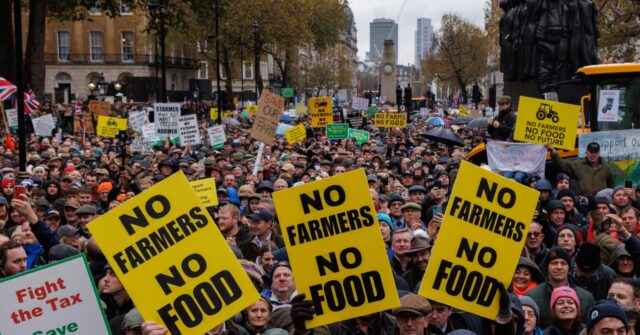On a recent Tuesday, over ten thousand protesters gathered in Whitehall, London, to voice their opposition to Prime Minister Keir Starmer’s proposed tax policy that critics argue poses a significant threat to the food security of the nation and the livelihoods of British farmers. The demonstration marked a stern response from the farming community to the Labour government’s plan to abolish the inheritance tax exemption for farms valued over £1 million, or £2 million for married couples, which would result in a 20 percent tax on estates exceeding this threshold. Despite measures taken by the Metropolitan Police to prevent tractors from entering London—aimed at avoiding disruptive protests seen in other parts of Europe—the outpouring of discontent was palpable, with the capital’s police estimating the turnout at over 10,000 attendees.
Among the high-profile attendees was former Top Gear host Jeremy Clarkson, well-regarded among farmers following his successful television series, Clarkson’s Farm, which highlights the challenges faced in the agricultural sector. Clarkson passionately urged the Labour government to reconsider its stance on the inheritance tax, proposing instead that the government find funds by cutting back on bureaucratic inefficiencies in Whitehall. His comments resonated with many farmers who feel marginalized in light of increasing regulations and pressures on their industry. Clarkson’s remarks highlighted a broader sentiment among demonstrators regarding the bureaucratic predicaments faced by farmers in maintaining their livelihoods.
The protest was further fueled by contributions from various political figures, including Nigel Farage, leader of Reform UK, who characterized the gathering as a struggle between farmers and the government. Farage addressed the historical significance of family farms, noting that these establishments have been managed by families for generations and should not be penalized for the practices of wealthier individuals gaming the inheritance tax system. He framed the farmers’ plight against the backdrop of broader challenges, including environmental policies and societal perceptions, which he claimed have led to feelings of devaluation among rural communities.
The Treasury, led by Chancellor Rachel Reeves, defended the proposed tax hikes, asserting that 27 percent of farms would fall under its impact. However, this estimate was fiercely challenged by organizations representing farmers, such as the National Farmers Union (NFU) and the Country Land and Business Association (CLA). The CLA’s research suggests that as many as 70,000 farms could find themselves liable for inheritance tax, with significant financial impact. For instance, a typical 200-acre farm with modest profits could face an inheritance tax bill exceeding £435,000, a sum that would essentially exceed the farm’s annual earnings. The notion suggested by the government of a ten-year payment plan was criticized as unfeasible, as the repayment burden would surpass farmers’ operational profits, placing many family farms in a precarious financial situation.
Liberal Democrat leader Ed Davey also attended the protest, echoing sentiments of solidarity with farmers against the proposed tax measures. He criticized the Labour government for its perceived lack of understanding regarding the needs of the agricultural sector, particularly when it comes to the generational transfer of land and the nature of farming business cash flows. Davey emphasized that the government’s approach fails to consider the historical and social complexities surrounding farm transitions, where assets do not necessarily equate to liquid cash, complicating tax obligations further.
In sum, the protest at Whitehall serves as a critical moment of rising tensions between the government and the farming community over proposed taxation policies. With farmers and their allies passionately communicating their fears about long-term implications for their industry, the event underscores a growing divide in perspectives on farming, land ownership, and the impact of government policies on rural communities. The challenges posed by the potential inheritance tax changes illuminate broader issues of financial sustainability in agriculture and the perceived disconnect between urban policymakers and the realities of rural life. As the situation unfolds, the dialogue between farmers, political figures, and the government remains crucial in balancing the interests of the farming community with national fiscal responsibilities.

